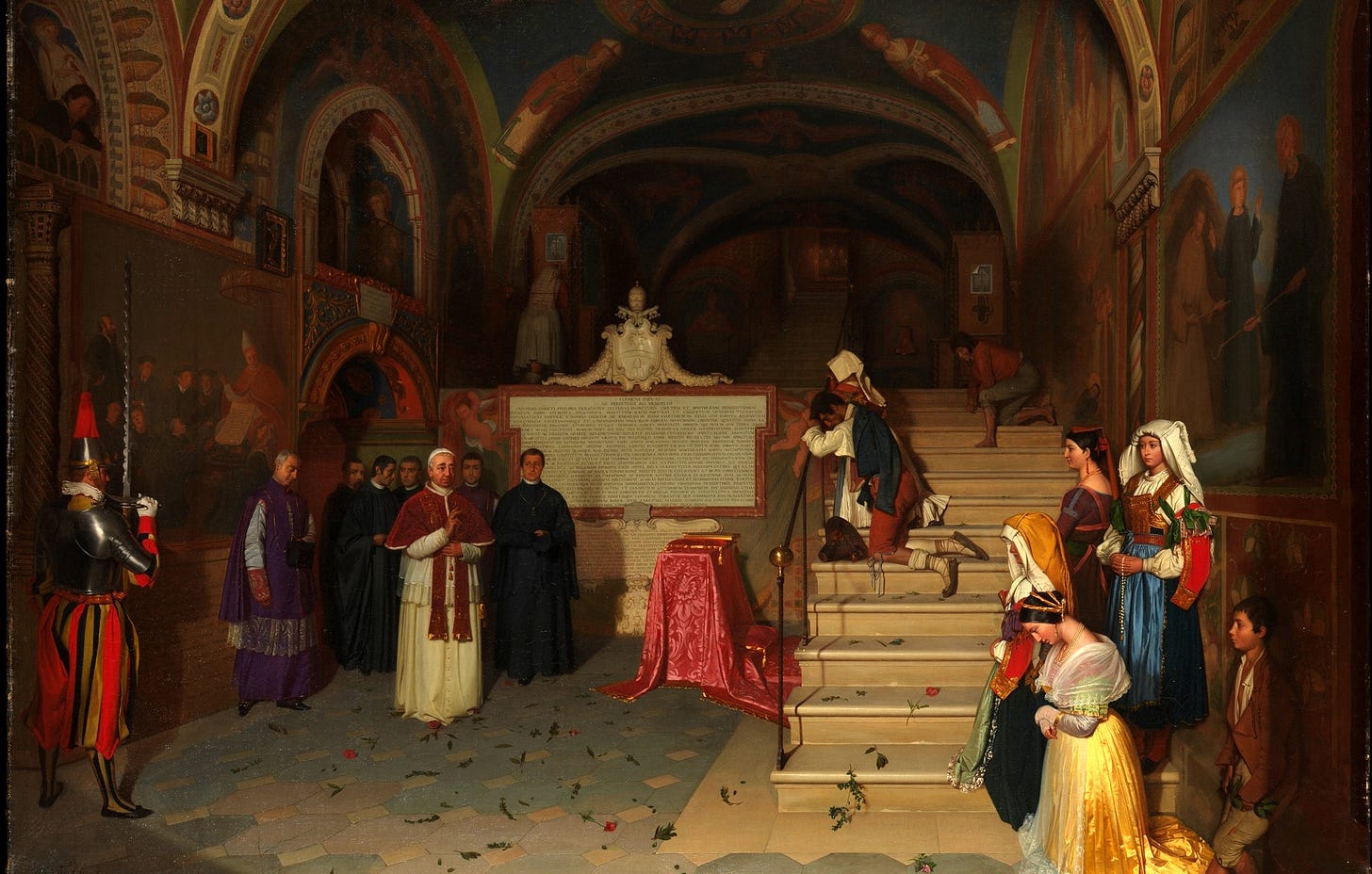Catholic rites and prayers for deceased non-Catholics? Pope Gregory XVI answers
Pope Gregory XVI rebuked the Bishop of Augsburg for his reaction to the death of the Protestant Queen Dowager. But on what grounds?

Pope Gregory XVI rebuked the Bishop of Augsburg for his reaction to the death of the Protestant Queen Dowager. But on what grounds?
Editor’s Notes
The following text is a translation of Pope Gregory XVI’s 1842 Epistola (Letter) to the Bishop of Augsburg.
Gregory XVI rebukes this bishop for…
Having Catholic rites used for the funeral of a non-Catholic – in this case, the Queen Dowager of Bavaria
Ordering his parish priests to offer “public supplications” reserved for Catholics to be offered for the same Queen Dowager (we have been unable to verify whether this refers to Requiem Masses or other public prayers, such as the Office for the Dead, etc.)
Ordering the eulogist to commend the late Queen Dowager to the prayers of the faithful
Forbidding the eulogist to explain the difference between between the funeral of the Queen Dowager and those of Catholics
Writing a letter which refers to the the Queen Dowager having been called to eternal life.
He also affirms that…
Supernatural faith is absolutely necessary for salvation, and this necessity is a dogma
It is a “vain deception” to say that “a man alienated from the true faith and Catholic unity can arrive at eternal life” if he dies in such a state
While there is indeed a possibility that God may secretly enlighten any given person in their dying moments, such that he does not die in this state, these “more secret mysteries of divine grace” are completely outside of the judgment of the Church
While civil honours are fitting for deceased royalty (and indeed all men, in proportion with their rank and dignity), it is thus forbidden to use Catholic rites for those who die in external and notorious heresies.
We cannot help but recall the many Masses offered at the time of the late Queen Elizabeth II’s passing. At the time, it was alleged that, despite being the head of a false religion, her late majesty was not a notorious heretic, as she had never been personally and publicly condemned. However, it does not seem that any such condemnation was issued against the Queen Dowager (Caroline of Baden, d. 13 November 1841). This did not prevent Gregory XVI from recognising the reality of her state, and expecting the Bishop of Augsburg to have recognised it as well.
Aspects of the state of the disciplinary side of this question may or may not have changed with the 1917 Code of Canon Law. However, the fundamental point that Gregory XVI conveys, based on principles rather than just positive law, is that it is gravely scandalous to speak or act as if someone who has died outside of visible communion with the Church could have been saved: what he calls the “more secret mysteries of divine grace” should remain secret, and be left to God's inscrutable justice and mercy.
May the souls of the faithful departed, through the mercy of God, rest in peace.
Epistola Officium
CXXXVII
Headings and some line breaks added.
To Peter, Bishop of Augsburg, writing with grave complaint concerning what was done at the funeral of the Queen of Bavaria, who had lived in heresy.1
To our venerable brother Peter, Bishop of Augsburg (Augsburg)
GREGORY XVI, POPE
Venerable brother, health and apostolic blessing.
We have received with great pleasure the office which your letter brought to us on the return of the Christmas solemnities and at the beginning of the new year. Grateful for the pious prayers which you offered for our welfare and for the prosperous course of our apostolic care, we in turn pray and beseech the Lord that he may heap upon you, venerable brother, more abundant gifts of heavenly grace, which may also descend copiously upon the sheep entrusted to your care.
Gregory XVI’s complaint: Catholic rites used, prayers enjoined
But you will take it well and fairly, venerable brother, if, to satisfy our duty, in this very familiar letter we complain gravely about what was done in your diocese when recently a non-Catholic princess, the most serene Queen Dowager, departed from among men.
It was indeed fitting that the Bavarians should honour the deceased queen with civil honours befitting her dignity. But our concern here is with the Catholic rites employed at her funeral: and we have before our eyes your letter which you gave to the parish priests on the nineteenth day of November on that matter. We can scarcely express in words how much grief we conceived in our mind when from reading the same we learned that you had ordered that those public supplications which have been instituted by the Church for all who have died in Christian and Catholic fellowship2 should be held there for a princess who, as she had most manifestly lived in heresy, so also died on her last day.
Nor does it matter at all to this if the same woman could have been illuminated to repentance in the final moments of life by the hidden mercy of God's grace. For these more secret mysteries of divine grace do not in the least pertain to the external judgement of ecclesiastical authority: and hence by the old3 as well as the new4 discipline of the Church it is forbidden that men, who have died in the external and notorious profession of heresies, should be honoured with Catholic rites.
But it was not enough for you to prescribe Catholic rites on this occasion; you also ordered that in the funeral eulogy of the deceased the sacred orator should especially commend her to the pious prayers of the faithful, and you forbade him to add anything further to explain the difference between that funeral and the funerals of Catholics.
The necessity of faith and grace for salvation
Indeed, in the beginning of your letter you were not afraid to speak of her death in such a way that you said she was called by God from this world into eternal life.
We do not indeed see how this, affirmed by you so confidently and with no accompanying declaration, can be reconciled with the Catholic dogma concerning the necessity of true Catholic faith for obtaining salvation; with that dogma, we say, which, among the principal articles included in the formulas of profession of faith,5 we too commended for defence in our encyclical letter to the bishops of Bavaria6 as an antidote against the raging plague of indifferentism, especially necessary at this time.
The need to repair the scandal
We do not write these things, venerable brother, as if we suspect in the least that this same doctrine of the Church is unknown to you: but a bishop, as you well know, must always speak and command and act in those things which will be for the edification of his flock, not for its destruction.
We do not doubt at all that, aroused by this our exhortation, you will strive to repair the scandal which came to the faithful from your letter and from that funeral, taking suitable opportunities afterwards as the matter may require and prudence may suggest; and that you will not neglect to fortify your faithful sheep in appropriate ways according to place and time against the vain deception of teachers who tickle itching ears, who imagine that a man alienated from the true faith and Catholic unity can arrive at eternal life, even if he dies in such a state.
To this end, and to avert the dangers of similar funerals hereafter, it will also be your duty to deposit this our letter carefully in your episcopal archive and to ensure that it is preserved there for the memory of posterity.
We await wholeheartedly some occasion to address you, venerable brother, in more pleasant letters. Meanwhile, do not doubt our most ardent charity towards you; of which indeed we could now give no clearer proof than that, having made known our opinion about that act of yours, we should exhort you to discharge your pastoral duty with greater caution and diligence day by day for the salvation of yourself and your flock. Finally, as a pledge of our same benevolence towards you, we add our apostolic blessing, which, drawn from the depths of our heart and joined with a prayer for every true prosperity, we most lovingly impart to you yourself, venerable brother, and to all clergy and lay faithful over whom you preside.
Given at Rome at Saint Peter's on the sixteenth day of February in the year one thousand eight hundred and forty-two, in the twelfth year of our pontificate. (16 February 1842)
Latin text available here, taken from Acta Gregorii Papae XVI, Vol. III, pp 199-200. Ed. Vincento Vannutelli, S.C. de Propaganda Fide, Rome, 1902.
We share this text with acknowledgments to Br Peter Dimond for having first drawn public attention to this text, in his video No Latin Mass Or Prayers For Dead Non-Catholics – Papal Teaching (11 March 2023).7
HELP KEEP THE WM REVIEW ONLINE WITH WM+!
As we expand The WM Review we would like to keep providing free articles for everyone.
Our work takes a lot of time and effort to produce. If you have benefitted from it please do consider supporting us financially.
A subscription gets you access to our exclusive WM+ material, and helps ensure that we can keep writing and sharing free material for all.
You can see what readers are saying over at our Testimonials page.
(We make our WM+ material freely available to clergy, priests and seminarians upon request. Please subscribe and reply to the email if this applies to you.)
Subscribe to WM+ now to make sure you always receive our material. Thank you!
Read Next:
Follow on Twitter, YouTube and Telegram:
From the Archive of Briefs to Princes.
From Augustine, book On the Care for the Dead, chapter 4 or number 6 (volume VI of the Maurist edition).
See Gregory II in chapter 3 of epistle 1 to Boniface, Apostle of the Germans (in Gratian, canon Pro obeuntibus 21, C. XII, q. 2); more accurately, however, in Hartzheim, Councils of Germany, volume I, page 39: chapter Sicut 8 on Heretics, from the Third Lateran Council of Alexander IV, chapter 2, same title, in the Sext.
Martin V with the Council of Constance in the constitution Inter cunctas, 22 February 1418, at the words et si tales (volume V of Councils of Germany, page 82); the Synod of Augsburg of the year 1567, part 3, chapter 15 (volume VII of Councils of Germany, page 195); the Council of Salzburg of the year 1569, constitution 51, chapter 9 (ibid., page 358); the Roman Ritual, title On Funerals.
See the Profession of Faith which the Latin Churches use; and also that which the Greek Catholics use, from the formula prescribed by Gregory XIII (constitution Sanctissimus 51, Roman Bullarium, new edition, volume IV, part 3, page 312); and finally that which other Eastern Catholics use, from the constitution of Urban VIII (in Benedict XIV, constitution Nuper 78, Bullarium of the same Pontiff, volume I).
This letter [Summo iugiter studio] was given to the archbishops and bishops of the Kingdom of Bavaria on the 27th of May 1832.



Wow! Such a firm yet charitable correction.
> you also ordered that in the funeral eulogy of the deceased the sacred orator should especially commend her to the pious prayers of the faithful
Are we to take from this that private prayers for deceased non-Catholics are also forbidden?